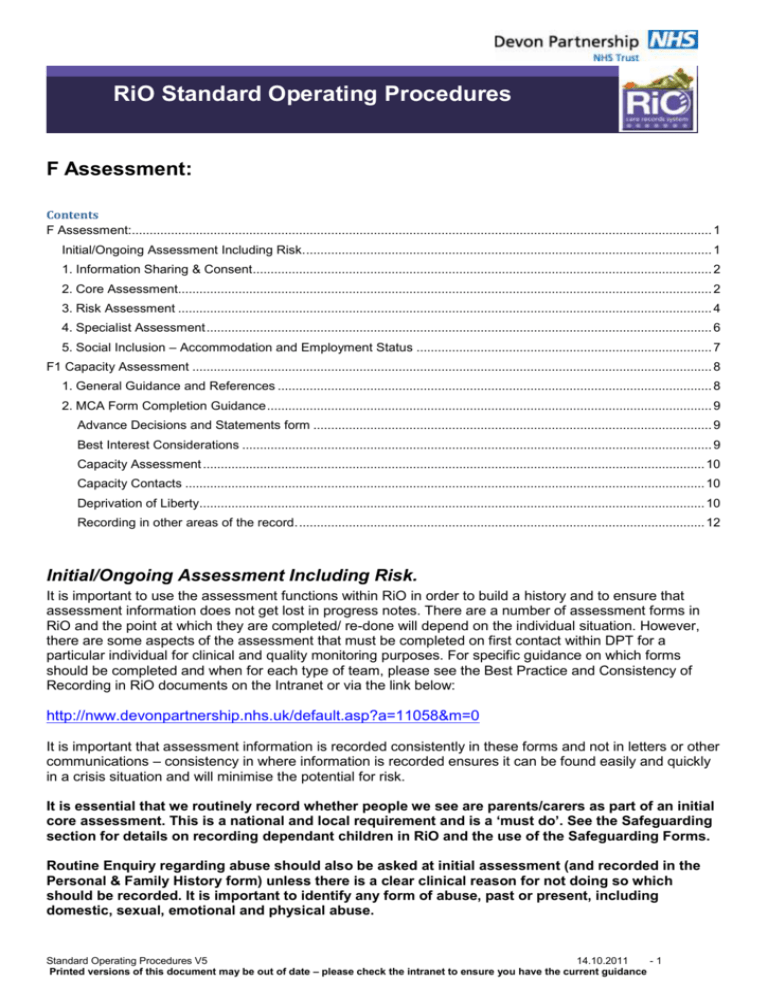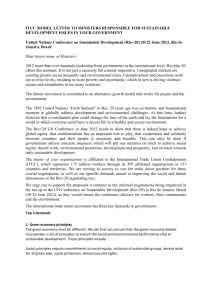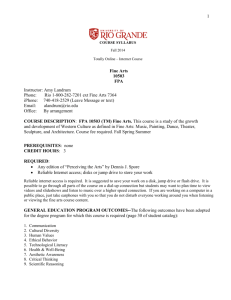F Assessment
advertisement

RiO Standard Operating Procedures F Assessment: Contents F Assessment:................................................................................................................................................................... 1 Initial/Ongoing Assessment Including Risk. .................................................................................................................. 1 1. Information Sharing & Consent ................................................................................................................................. 2 2. Core Assessment...................................................................................................................................................... 2 3. Risk Assessment ...................................................................................................................................................... 4 4. Specialist Assessment .............................................................................................................................................. 6 5. Social Inclusion – Accommodation and Employment Status ................................................................................... 7 F1 Capacity Assessment .................................................................................................................................................. 8 1. General Guidance and References .......................................................................................................................... 8 2. MCA Form Completion Guidance ............................................................................................................................. 9 Advance Decisions and Statements form ................................................................................................................ 9 Best Interest Considerations .................................................................................................................................... 9 Capacity Assessment ............................................................................................................................................. 10 Capacity Contacts .................................................................................................................................................. 10 Deprivation of Liberty.............................................................................................................................................. 10 Recording in other areas of the record. .................................................................................................................. 12 Initial/Ongoing Assessment Including Risk. It is important to use the assessment functions within RiO in order to build a history and to ensure that assessment information does not get lost in progress notes. There are a number of assessment forms in RiO and the point at which they are completed/ re-done will depend on the individual situation. However, there are some aspects of the assessment that must be completed on first contact within DPT for a particular individual for clinical and quality monitoring purposes. For specific guidance on which forms should be completed and when for each type of team, please see the Best Practice and Consistency of Recording in RiO documents on the Intranet or via the link below: http://nww.devonpartnership.nhs.uk/default.asp?a=11058&m=0 It is important that assessment information is recorded consistently in these forms and not in letters or other communications – consistency in where information is recorded ensures it can be found easily and quickly in a crisis situation and will minimise the potential for risk. It is essential that we routinely record whether people we see are parents/carers as part of an initial core assessment. This is a national and local requirement and is a ‘must do’. See the Safeguarding section for details on recording dependant children in RiO and the use of the Safeguarding Forms. Routine Enquiry regarding abuse should also be asked at initial assessment (and recorded in the Personal & Family History form) unless there is a clear clinical reason for not doing so which should be recorded. It is important to identify any form of abuse, past or present, including domestic, sexual, emotional and physical abuse. Standard Operating Procedures V5 14.10.2011 -1 Printed versions of this document may be out of date – please check the intranet to ensure you have the current guidance RiO Standard Operating Procedures Many informal assessments are carried out on every contact e.g. has there been a change to risk, capacity, mental state and the current picture will be recorded in the progress notes with the Core Assessment, Risk Assessment and Capacity Assessment updated/ completed if required. With regard to capacity to engage in treatment / intervention, if this is assessed as not being present then the legal basis for intervention needs to be considered. (MHA, MCA) When booking or recording the outcome of an appointment that involved an assessment, it is important to select the relevant appointment type. ‘New Patient Assessment’ should be used to indicate the first assessment following the receipt of a referral. Initial Assessment should be selected as the activity before outcoming the appointment. 1. Information Sharing & Consent This is generally completed at initial contact with DPT. There is an adapted version of the form on the Consistency & Best Practice section of the RiO pages of the Intranet (see link above) and this should be used with the person. Where on RiO Guidance MCA & Information Sharing and Consent This should be completed for everyone at the first point of contact with Devon Partnership Trust by whichever team has this contact. A paper copy should be signed, scanned and uploaded to RiO. The information entered in the form on RiO will be pulled through to the printable Care Plan/CPA review. If it would be detrimental to the therapeutic relationship and/or the person does not have capacity to complete this at initial assessment, the HCP must note on RiO ‘not clinically acceptable to complete at present’ and update the form at the earliest opportunity. Where this is on the grounds of capacity the details of this assessment should be recorded in RiO. This form should also be used to record people’s preferences or requirements in terms of how they are communicated with e.g. no post to home address/ letters to correspondence address (which should be added to the addresses in the demographics – See Section B), large font required, no phone calls to home landline etc. If use of the secure envelope has been authorised, this should be referred to within this form. 2. Core Assessment How much of this should be completed, by which team and when is detailed in the Best Practice and Consistency of Recording in RiO Documents available in the RiO pages of the Intranet or via the link below. http://nww.devonpartnership.nhs.uk/default.asp?a=11058&m=0 The Core Assessment Overview can be used to view all assessment related information and the overview point in time allows you to select a date and view the content of the Core Assessment on that date. During a single episode of care, the current assessment should be added to by editing (e.g. during an inpatient stay or during a period of care co-ordination) – indicating in the text when and by who the addition was made. There is no specific guidance on who completes which bit of the core assessment but it is likely that forms such as Physical Examination will be completed by medical staff during inpatient stays for example. Standard Operating Procedures V5 14.10.2011 -2 Printed versions of this document may be out of date – please check the intranet to ensure you have the current guidance RiO Standard Operating Procedures Where information is being copied and pasted into the Core Assessment from previous documents held either in paper notes or ePex, the source of this information, the date it was written and author should be indicated at the top of the text. E.g. From Oak Ward Discharge Summary 12/05/09 by Dr Jones. Core Assessments should be reviewed every 6 months as a minimum and updated as appropriate. This includes Formulation and Risk Assessment. When someone returns to DPT after previously being discharged, you should always use ‘create new’ in the assessment forms (except Mental Health History & Physical Health History which are always added to). For most forms this will bring through the text from the previous version which you should edit according to your new assessment. RiO reduces duplication in this respect. For other sections where you are not adding to history e.g. ‘Mental State’ this will be blank and you will need to complete a new record. Where on RiO Guidance Core Assessment Clinically relevant information should be recorded in the appropriate part of the Core Assessment. Not all boxes need to be completed for all cases; the exact content of the Core Assessment will depend on the individual presentation and the scope of the assessment. Create New for each referral. Used to record the presenting situation and current interventions. Only the medication the person is currently taking at the time of referral should be recorded along with the sources it was checked with – it is essential that this is recorded here and not in the progress notes for ease of access and (where the assessment leads to admission) for reporting on the CQUIN target regarding medicines reconciliation. Presenting Situation & Referral Outcome Decision Mental Health Legislation / Protection of Vulnerable Adults This is an ‘add to’ form and would only be created new at first presentation to DPT and then added to as required. This is an ‘add to’ form and would only be created new at first presentation to DPT and then added to as required. The Personal & Family History form contains the routine enquiry regarding abuse and this should be recorded here. Family details regarding children or dependant adults should be recorded here. This form should be created new for each referral from an external source to DPT and should then be added to by editing current. This form contains the first level of safeguarding children information in that it asks if additional support is required to parent children. This form should be created new for each referral from an external source to DPT and should then be added to by editing current. More details of its use in Safeguarding Vulnerable Adults & Children section of the SOPs. This form should be created new for each referral from an external source to DPT and should then be added to by editing current. Forensic & Probation History This form should be created new for each referral from an external source to DPT and should then be added to by editing current. Substance and Alcohol Use This form should be created new for each referral from an external source to DPT and should then be added to by editing current. Problematic Substance & Alcohol This form is only used when problematic substance and alcohol use has been identified. Mental Health History Physical Health History Personal & Family History Social History/ Care Management Standard Operating Procedures V5 14.10.2011 -3 Printed versions of this document may be out of date – please check the intranet to ensure you have the current guidance RiO Standard Operating Procedures Use Mental State Examination Physical Examination Physical Health Assessment Physical Monitoring Nutrition Body Map Annotation Client and Carers understanding of assessment Formulation/ Summary This form should be created new for each referral from an external source to DPT and should then be added to by editing current. Always create new. This should be completed on initial assessment and at each review point as a minimum. Include the outcome of relevant assessments such as MMSE or ACE-R. Always create new. This should be completed within 24 hrs of admission and VTE assessment should be recorded in the ‘any other’ text box with a description of the outcome of the assessment and the code **VTE1**. Always create new. Include the result of other relevant assessments such as the Waterlow and Falls assessment. Relevant monitoring information must be recorded in here and can be used to generate a chart of information over time. O2 Sats should be recorded in the Respiration box on this form. Always create new. Always create new. Always create new. Create new for each assessment as this is relates to a specific assessment. Create New. Formulation/Summary is a brief overview of the assessment and will help structure your Care Plan interventions. Link provided on the form to the Care Plan. Include results from measures such as GAD-7 & PHQ-9 etc. which support the formulation process. Following initial assessment (e.g. by MWA) an outline plan can be included here and the text copied and pasted into the letter to the person/referrer. There may be a number of current formulations relating to contact with different services within DPT. 3. Risk Assessment It is very important that clinical risk information is recorded in the correct place on RiO, i.e. within the Risk Assessment Form that can be found in the Case Record, Risk Information folder. The current risk assessment should be reviewed and added to providing changes in risk are recorded in the appropriate text box and the appropriate button selected – not simply entered in the summary box. Changes should be dated and the name of the assessor entered. Risk assessments must be reviewed every 6 months as a minimum and a new Risk Assessment form created which pulls through text from the previous form which can be edited. Where the person moves from one service to another e.g. from inpatients to community, the risk assessment must be reviewed and summarised prior to the transfer. The previous version of the form will remain viewable in the history. Latest Risk Information can be viewed quickly from the link on the front of the case record. This will show both the Risk Assessment and any progress notes that have been linked to Risk. Where staff are concerned that someone poses an immediate threat to the public or specific individuals and they believe that there may be further information held by police or probation, they should seek advice from the MAPPA lead or the guidance available at: http://nww.devonpartnership.nhs.uk/default.asp?a=11522&m=0 Standard Operating Procedures V5 14.10.2011 -4 Printed versions of this document may be out of date – please check the intranet to ensure you have the current guidance RiO Standard Operating Procedures Assessment Where to find in RiO (folder name) Notes Risk Assessment Risk Information To be completed for all relevant people who use our services in line with Policy. Safeguarding adults and children issues can be identified in the risk assessment, either with the person identified as vulnerable or the victim, or as the perpetrator or likely perpetrator. See Safeguarding Section. When completing the risk assessment form: Selecting ‘yes’ = there is a risk Selecting ‘no’ = there is no risk Leaving blank = the risk has not been assessed – the reason for this should be given in the text box and any actions to be taken in this regard recorded within the Risk Summary. Where someone is identified as a MAPPA nominal, it is essential that the MAPPA box is ticked and any boxes relevant to the offending/ risk history are ticked. The supporting comments should include reference to any documents or other information on the system e.g. MAPPA minutes. Ticking boxes is not sufficient for identifying assessed risk. Supporting comments must always be added in the relevant free text box. Care should be taken when recording risk information from a third party whose information requires sensitive handling in the event of an access to records request. Where information is from a third party, this should be noted in the appropriate free text comments box. The “Summary” of the Risk Assessment should provide a working understanding of someone’s key risks. 1. What are main ‘live’ risks (including statement re: likelihood and level of risk) 2. What increases the risk? (precipitating factors) 3. What are the ‘historical’ or residual risks? 4. What is the plan to reduce and/or manage the current risk? The overall management of risk is taken into account in Care Planning and the review of these should be recorded in the progress notes, linked to the relevant Care Plan. The summary should also identify areas where further risk assessment is required as risk is currently unknown and how this will be addressed. Standard Operating Procedures V5 14.10.2011 -5 Printed versions of this document may be out of date – please check the intranet to ensure you have the current guidance RiO Standard Operating Procedures Safeguarding Forms Risk Information See Safeguarding section for details. Risk incidents Risk information HCR-20 Risk Information Observations Risk Information DO NOT USE - Risk incidents should be reported using the Trust Incident Reporting system and clinical information relating to the incident should be recorded in the progress notes and linked to risk. This should prompt a review of the current risk assessment and Care Plan to ensure that they remain appropriate. This is specific to Forensic Services and should be completed prior to discharge as a minimum. This is a children’s services form and should NOT be used. The Adult Mental Health observation and seclusion forms are under the specialist assessment heading - see below. The Risk Information folder also contains the Child Safeguarding forms. The Safeguarding section of the SOPs gives specific guidance on the use of these forms. 4. Specialist Assessment The grid below identifies when and by whom these should be used. Two of the forms are not to be used within DPT at present. Specialist Assessment Guidance MOHO OT Assessment Includes: These should only be completed by appropriately trained Occupational Therapists as required. Always create new. - ACIS MOHOST OCAIRS Occupational Self Assessment (OSA) Summary - OPHI-II - VQ - WEIS - WRI NCDS NDTMS Observation/Seclusion Includes: - Access to Fresh Air - Observation - Seclusion Will be visible but not to be used as it is related to Children’s’ Services (currently out of scope). Will be visible but not to be used as it is related to specialist Substance Misuse services (currently out of scope). Use the substance misuse forms in the core assessment to record issues in this area. None of these forms are in use. See p 24 Standard Operating Procedures V5 14.10.2011 -6 Printed versions of this document may be out of date – please check the intranet to ensure you have the current guidance RiO Standard Operating Procedures 5. Social Inclusion – Accommodation and Employment Status These items form part of the National Reporting Indicators, PSA 16 ‘Increase the proportion of socially excluded adults in settled accommodation and employment, education or training’ and KPI 186 & 187, and must be completed for every person accepted for a service. This should be completed and updated i.e. at initial assessment, formal reviews or when updates are known but a new form should be created at least annually. Item Guidance To be completed on RiO Settled Accommodation Indicator Select the most appropriate option from the drop down list Yes Accommodation Status Select the most appropriate option from the drop down list Yes Employment Status Select the most appropriate option from the drop down list and complete the rest of the form as appropriate. Yes Standard Operating Procedures V5 14.10.2011 -7 Printed versions of this document may be out of date – please check the intranet to ensure you have the current guidance RiO Standard Operating Procedures F1 Capacity Assessment 1. General Guidance and References All of these forms are found in the MCA & Information Sharing & Consent folder on the right of the case record. This guidance relates to recording in RiO, for guidance on assessment, responding to advance directives etc you must refer to DPT policies C24 Advance Decisions and DPT Policy M07 Mental Capacity Act (including Deprivation of Liberty). The Best Interest and Capacity Assessment forms will only be used to indicate that a complete Capacity Assessment including Best Interest decision has been recorded on the pro forma and uploaded to Clinical Documents in the case record. The same is true for the Deprivation of Liberty Safeguards form. All of the rest of the forms should be used in full. Specific guidance for the completion of each form is below. The Capacity Assessment form can be found on the intranet under policies and procedures, M07 Mental Capacity Act or by following the link below: http://www.devonpartnership.nhs.uk/PublicationsLibrary.24.0.html?&no_cache=1&task=show&uid=797&cHash=611ad9296255500761b84efff67fd01a Capacity is assumed unless there is evidence to indicate that it may be lacking in which case a specific assessment of capacity should be undertaken. Capacity to make decisions is specific to the decision in question at the time that the decision needs to be made. The capacity assessment form must be completed for any ‘serious’ medical decision (i.e. life changing treatment – see the Trust policy detailed below) and any admission to hospital or residential care for longer than 28 days. Day to day decisions should be recorded in progress notes and be represented in care plans. Informal assessments of capacity are part of clinical contact as much as informal risk assessment and might include assessing someone’s capacity to engage in treatment/ intervention. Trust Policies must be adhered to in relation to recording, acting on or disregarding advance decisions / statements and assessments carried out under the Mental Capacity Act including decisions arising from this. These also provide guidance on the relationship between Advance Decisions, the Mental Capacity Act and the Mental Health Act. There is a Mental Capacity Act link on the right hand side of the home page of the Intranet which takes you to all the Trust guidance regarding this (see below). Link to M07: http://nww.devonpartnership.nhs.uk/default.asp?a=8294&m=0 Link to C24: http://nww.devonpartnership.nhs.uk/default.asp?a=8427&m=0 Further guidance on applying the Mental Capacity Act can be found in the Code of Practice. Link to Code of Practice: http://www.publicguardian.gov.uk/mca/code-of-practice.htm Link to Mental Capacity Act page on the intranet: http://nww.devonpartnership.nhs.uk/default.asp?a=11359&m=0 Case studies regarding the use of the Mental Capacity Act can be found on the Devon County Council website: http://www.devon.gov.uk/index/socialcarehealth/adult-protection/mentalcapacityact/mca-practice-guidance/mcapg31.htm Standard Operating Procedures V5 14.10.2011 -8 Printed versions of this document may be out of date – please check the intranet to ensure you have the current guidance RiO Standard Operating Procedures 2. MCA Form Completion Guidance Advance Decisions and Statements form (If required, this form can be used to record that the question regarding advance decisions has been asked but the person has not identified any actions or preferences they wish to record) Item General Guidance Date of Assessment Life sustaining treatment Other Decisions Written Where is it held? Date Advance decision was made Contents of advance decision/ Statement Date the Advance Decision became invalid Guidance It is important to record information here as it will be readily accessible to assist in best interest assessments should the individual lack capacity at any point and can be used by involved clinicians to inform their work. Where the decision has been written by the person as a separate document (best practice) it should be scanned and uploaded to RiO with the document type ‘Advance Directives’ (advance decisions) selected from the drop down list on the document upload screen. An advance decision to refuse life sustaining treatment, must meet the legal criteria, i.e. it must be signed, witnessed and be clearly related to a particular treatment and disorder. WRAP and Contingency plans would also be referred to in this form. The terms ‘advanced statement’ and ‘advanced decision’ are often used interchangeably. They do, however, have different meanings. An ‘advanced decision’ relates solely to the refusal of treatment. Unlike an ‘advance statement’, an ‘advance decision’ has the potential to be legally binding (Policy C24 Advance Statements). Enter the date on which the Advance Directive was discussed/ identified Select the appropriate option from the drop down list Select the appropriate option from the drop down list Select the appropriate option from the drop down list Detail of who holds a formal, written Advance decision document Enter if known Brief summary of document content and detail of the document title if uploaded to Clinical Documentation. Where the advance decision is a statement rather than a document, full details should be recorded in here including any witnesses to the statement and the circumstances under which it was made. The content of this should be confirmed by the person making the statement and where possible a signed copy of the statement uploaded to RiO. This should only be completed if the person changes their decision, decides to withdraw it or update it. Where a new decision is made, a new form should be completed and the new document scanned and uploaded. Best Interest Considerations The Best Interest Decision making process is incorporated in the DPT M07 Joint Assessment form (see link above) which should be completed electronically, saved to a network drive and then uploaded to the case record in clinical documentation as document type Mental Capacity Act. The RiO naming convention should be followed. Once the document has been uploaded to RiO, the version saved on the network drive MUST be deleted. The RiO form is then completed as indicated below in order to indicate that these considerations have been made and where the detail is recorded. Item Guidance Date of Enter the date that the Best Interest Decision was made. Assessment Standard Operating Procedures V5 14.10.2011 -9 Printed versions of this document may be out of date – please check the intranet to ensure you have the current guidance RiO Standard Operating Procedures Best Interest Considerations’ Reference the uploaded document Capacity Assessment The full Capacity Assessment process is recorded on the DPT M07 Joint Assessment form (see link above) and uploaded to the case record (see above). The Capacity Assessment form in RiO MUST be used in order to indicate that a capacity assessment has been carried out but only the following needs to be recorded in this form: Item Guidance Date of Enter the date that capacity assessment was carried out. Assessment Decision Related to Brief outline of the decision in relation to which the capacity assessment is being carried out Does the Client Choose yes or no. Lack Capacity If yes, what was Refer to the uploaded document including the date of the document and the document the decision? title. Briefly outline the decision made in this, e.g. It was decided to go ahead with Mary’s blood tests in the interests of her physical health. See uploaded document RILEDevEx Capacity Assessment dated 12/09/11. (RILEDevEx= Recovery & Independent Living, East Devon, Exmouth.- a list of team abbreviations is in Section M, RiO Documentation) No other part of this form need be completed. Capacity Contacts Item Guidance This should only be completed where an Independent Mental Capacity Advocate, Lasting or Enduring Power of Attorney or a Court Appointed Deputy are involved Deprivation of Liberty The DoLS office at Devon County Council must be contacted to initiate Deprivation of Liberty Safeguards Assessments and the Mental Health Act Office in DPT must be informed. They hold the record and DCC provide or deny the required authorisation. Any forms sent or authorisations received would be scanned and uploaded by the Mental Health Act Office using the RiO naming convention for the document title, under document type ‘Deprivation of Liberty Safeguards’ with the comments box used to indicate the nature of the document. The Mental Health Act Office will then complete the DoLS form in RiO as below. Link to DPT guidance on DoLS: http://nww.devonpartnership.nhs.uk/default.asp?a=11359&m=0 Item Date of Assessment Urgent Authorisation Date Form 1 Urgent Authorisation complete Duration (days) Expiry Date Reason for Guidance Enter the date that Deprivation of Liberty assessment was carried out.. Date Urgent Authorisation started Tick for yes – form must be uploaded to the record as document type Deprivation of Liberty Safeguards using the standard naming convention Length of urgent authorisation Date the authorisation expires Refer to the uploaded documents including the document title and date where these Standard Operating Procedures V5 14.10.2011 - 10 Printed versions of this document may be out of date – please check the intranet to ensure you have the current guidance RiO Standard Operating Procedures Urgent Authorisation Extension Date Form 1 Completed Authorised Duration (days) Expiry Date Reasons for Extension Standard Authorisation Start date Form 4 Completed Expiry Date Reason for Standard Authorisation Conditions of Authorisation Authorisation Review Date Form 19 Completed Reasons for Review Review Outcome Suspension of Authorisation Date Form 14 Completed Reason for Suspension Suspension End Date Form 15 Completed Reason for Lifting Suspension refer to an urgent authorisation. E.g. See uploaded document ‘UICStJC DoLS Urgent Form’ dated 12/09/11. (UICStJC = Urgent/Inpatient Care, St John’s Court.- a list of team abbreviations is in Section M, RiO Documentation) Date extension starts Tick if complete - form must be uploaded to the record as document type Deprivation of Liberty Safeguards using the standard naming convention Length of extension Date the extension ends Refer to the uploaded documents including the document title and date Date this starts Tick if complete - form must be uploaded to the record as document type Deprivation of Liberty Safeguards using the standard naming convention Date this ends Refer to the uploaded documents including the document title and date where these refer to a standard authorisation. Refer to the uploaded documents including the document title and date Date this was carried out Tick if complete - form must be uploaded to the record as document type Deprivation of Liberty Safeguards using the standard naming convention Refer to the uploaded documents including the document title and date Refer to the uploaded documents including the document title and date Date this started Tick if complete - form must be uploaded to the record as document type Deprivation of Liberty Safeguards using the standard naming convention Refer to the uploaded documents including the document title and date Date the suspension came to an end Tick if complete - form must be uploaded to the record as document type Deprivation of Liberty Safeguards using the standard naming convention Refer to the uploaded documents including the document title and date Standard Operating Procedures V5 14.10.2011 - 11 Printed versions of this document may be out of date – please check the intranet to ensure you have the current guidance RiO Standard Operating Procedures Recording in other areas of the record. Care Plan Risk Assessment Progress Notes Care plans should be created to identify ongoing care/ decisions that are taken for or on behalf of someone who is assessed as not having capacity to take these decisions themselves. The care plan should identify how the decisions in question are being made, and how the person is being involved where possible. The Crisis, Relapse and Contingency form should include the person’s preferences regarding future care and this should be referenced in the Advance Directive form. Where lack of capacity puts an individual at risk because of their inability to identify and respond to risk, this must be included in the risk assessment. Any intervention requiring an informal assessment of capacity or a decision to be made on the individual’s behalf that does not fall within the criteria for a full assessment should be recorded in the progress notes. Progress notes regarding a risk incident should be linked to risk and the risk assessment updated. Progress notes that refer to an advance directive/ decision particularly if this is a verbal statement should be linked to significant events and the person’s preferences recorded in the Advance Decisions form and/ or Crisis, Relapse and Contingency form as appropriate. Standard Operating Procedures V5 14.10.2011 - 12 Printed versions of this document may be out of date – please check the intranet to ensure you have the current guidance








